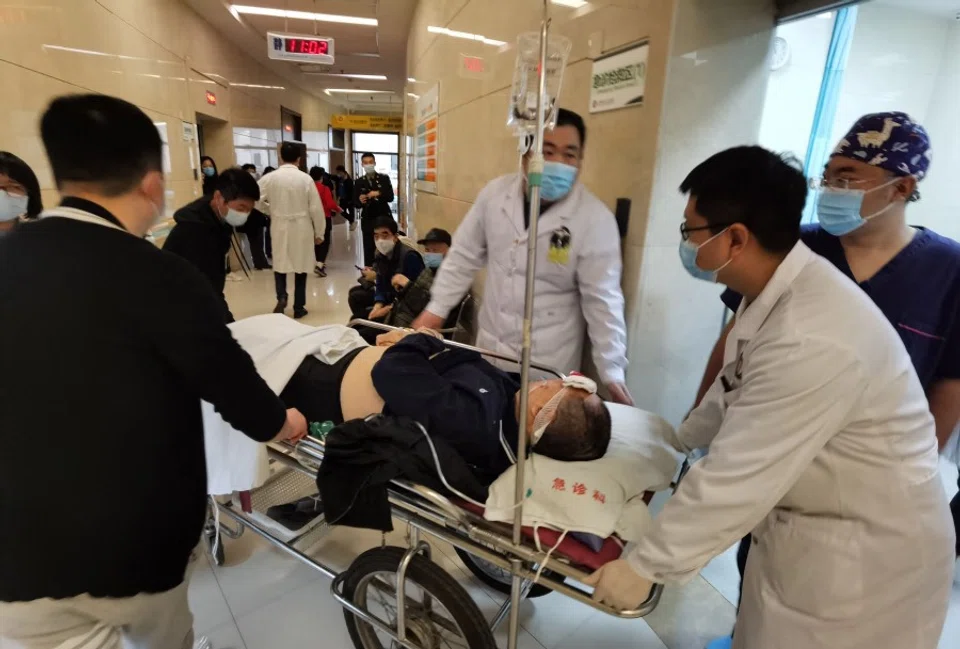China's medical crackdown has unintended repercussions
Over the past month, China's medical sector has been swept by a wave of anti-corruption efforts, with nearly 180 hospital directors and secretaries under investigation so far. Some people cheer the aggressive effort, but it has also created a lot of unintended repercussions. Lianhe Zaobao journalist Chen Jing discusses her own experience seeing doctors in China and warns of the potential drawbacks of a stern crackdown.

Over the past month, anti-corruption efforts in China's medical sector have been escalating, with major action seen nearly every week.
Unprecedented anti-corruption drive
On 15 July, four agencies including the National Healthcare Security Administration and the Ministry of Finance issued a joint notice, stating their intention to thoroughly investigate various illegal activities in the healthcare sector. Then on 21 July, the National Health Commission, along with various agencies, held a video conference to outline a year-long campaign to address corruption in the medical and pharmaceutical sectors.
Since August, there have been almost daily reports of medical sector officials being removed.
A week later, the National Supervisory Commission of the Central Commission for Discipline Inspection held a mobilisation meeting, calling for a comprehensive crackdown on medical corruption covering the entire chain and sector.
Subsequently, at least 20 provinces announced their commitment to ramp up anti-corruption efforts in the medical sector, with several opening hotlines for making reports. Since August, there have been almost daily reports of medical sector officials being removed. According to Chinese media, as of 12 August, at least 176 hospital directors and secretaries have been investigated, double compared with the 88 people investigated in 2022.
While China has been combating corruption in the medical sector for years, the intensity of the current anti-corruption drive is unprecedented. Besides targeting bribery in the procurement of drugs and medical equipment, many academic conferences, forums and training sessions that were previously thought to be within regulations have been postponed or cancelled.

From heads of hospitals and medical representatives to pharmaceutical company executives, everyone is affected, while stock prices of Chinese pharmaceutical companies have dropped over the past week. This unprecedented anti-corruption campaign has rocked the medical sector and sparked strong opposing views among the public.
Mixed reaction
Over the past week, two pieces of related news have been widely shared on social media. One article came from the website of the Chinese Communist Party (CCP) Guangdong Provincial Commission for Discipline Inspection and Supervision. It reported that after the director of a hospital in Zhongshan was arrested for accepting nearly 30 million RMB (about US$4.1 million) in kickbacks and bribes, hospital procurement costs and medical costs for the public significantly decreased. The average per capita medical cost dropped by over 1,400 RMB.
Many netizens applauded this news. They felt that corruption by "medical parasites" is a major reason for the heavy burden of medical costs, and called for thorough investigations into hospitals across the country.
... night shift allowances in hospitals were cancelled as they were deemed "irregular subsidies", making frontline healthcare workers suffer for the corrupt ways of administrative leaders.
The other news story involved doctors at a tertiary hospital in a provincial capital in southern China. They disclosed that as orthopaedics and cardiology use a lot of materials and medicines, elective procedures for those specialties have completely halted due to concerns about making mistakes and facing penalties under strict scrutiny. The number of surgeries performed under these specialties significantly dropped.
The comments on this news story have brought together healthcare workers who can relate to the situation. Some reveal that recently, night shift allowances in hospitals were cancelled as they were deemed "irregular subsidies", making frontline healthcare workers suffer for the corrupt ways of administrative leaders.
Others note that grassroots medical personnel are already underpaid, and "if this goes on, doctors from public hospitals would switch to private ones."
More harm than good?
On the one hand are the ordinary patients struggling with rising medical costs, and on the other are grassroots healthcare workers facing decreasing benefits. Both sides face economic pressures, but have totally opposite attitudes toward medical corruption, highlighting the distorted state of China's healthcare system. Indeed, this is a challenging issue to resolve in the country's anti-corruption efforts.

My experience as an outpatient in both public and private hospitals during my time in Shanghai is very different. Expensive private clinics offer a pleasant environment without long queues, where doctors and nurses are amiable and responsive. In contrast, public hospitals, though affordable, are constantly crowded, with security personnel needed to maintain order at the entrance.
A graduate-level resident doctor may earn less than 2,000 RMB per month in their first year, far below market rates.
Many patients travel from far away, so doctors would have to seize every second to see more people. Each patient's conversation with their doctor barely lasts 30 seconds before they are pressured by the next patient to end their consultation.
Each time I visit a public hospital, I feel for the medical staff's plight and the patients' difficulty in seeking medical attention - this sentiment is backed by data. Unlike developed countries where medical staff salaries account for around 60% of total hospital expenditure, this figure is only around 30% in developed Chinese cities. A graduate-level resident doctor may earn less than 2,000 RMB per month in their first year, far below market rates. This situation has led to recurring problems such as "over-treatment" and the reliance on prescribing medication for income.
On the other hand, the past three years of the pandemic have increased the financial burden on the healthcare system, and the ongoing healthcare reform has added to hospitals' pressure to generate profit.

Friends working in hospitals have lamented that hospitals have to bear any costs above insurance limits. Towards the end of the year, almost every hospital adopts a policy of not doing procedures or taking in patients unless necessary, in order to avoid losses. In the end, it is the patients who suffer.
... if the root causes of corruption are not addressed and healthcare professionals are not compensated fairly for their efforts and societal standing, the underlying problems will persist and unintended consequences might arise.
Underlying problems
This swift anti-corruption drive in the medical sector reminds many of the "double reduction" measures in the education sector two years ago. Even with strict regulations on extracurricular tutoring, the industry still exists but has moved underground, with higher costs. These major industry rectifications have had limited impact on alleviating "involution" and reducing the costs of having children. On the contrary, they have led to many young workers losing their jobs, contributing to the current high youth unemployment rate.
While this lightning crackdown can deter corruption in the short term by severing the complex web of vested interests in the pharmaceutical industry and reducing the "grey" income in the medical sector, if the root causes of corruption are not addressed and healthcare professionals are not compensated fairly for their efforts and societal standing, the underlying problems will persist and unintended consequences might arise.
It remains uncertain how intense this anti-corruption drive will get. Hopefully, it will not be a passing shower, but an opportunity to identify solutions that address both the symptoms and causes. In this case, healthcare workers and patients can see the rainbow after the rain.
This article was first published in Lianhe Zaobao as "医药反腐风暴卷了谁".



![[Photos] Fact versus fiction: The portrayal of WWII anti-Japanese martyrs in Taiwan](https://cassette.sphdigital.com.sg/image/thinkchina/3494f8bd481870f7c65b881fd21a3fd733f573f23232376e39c532a2c7593cbc)

